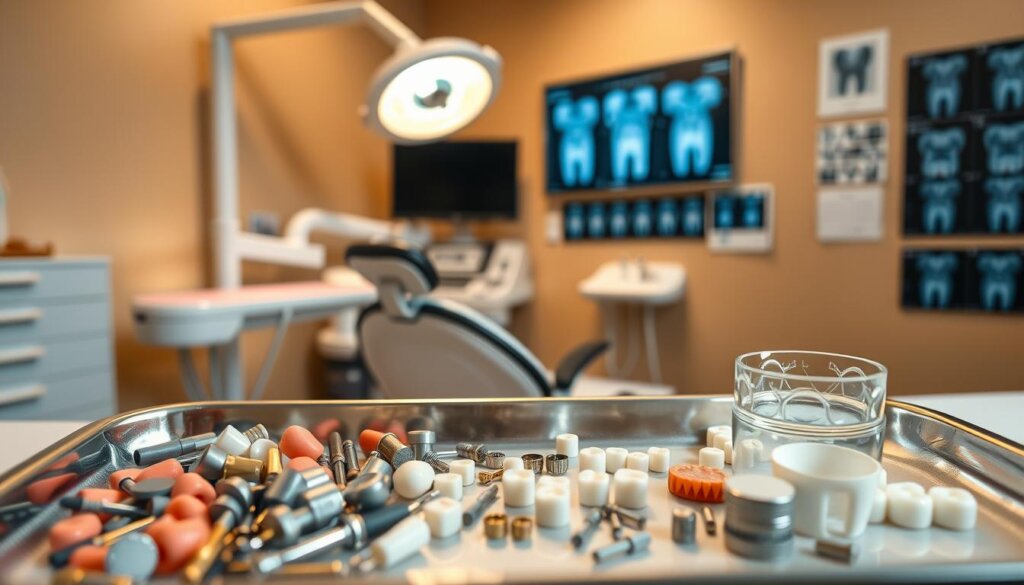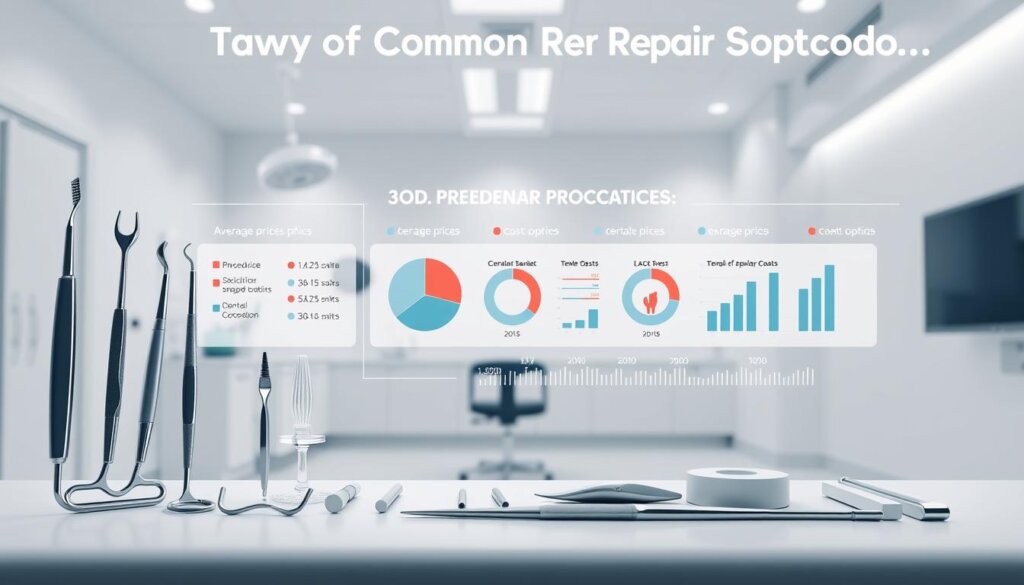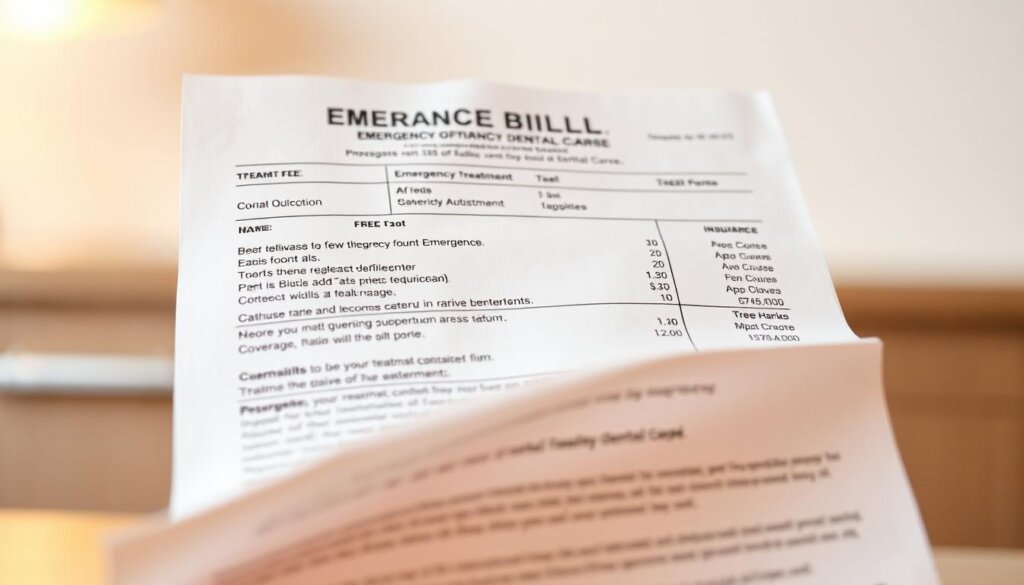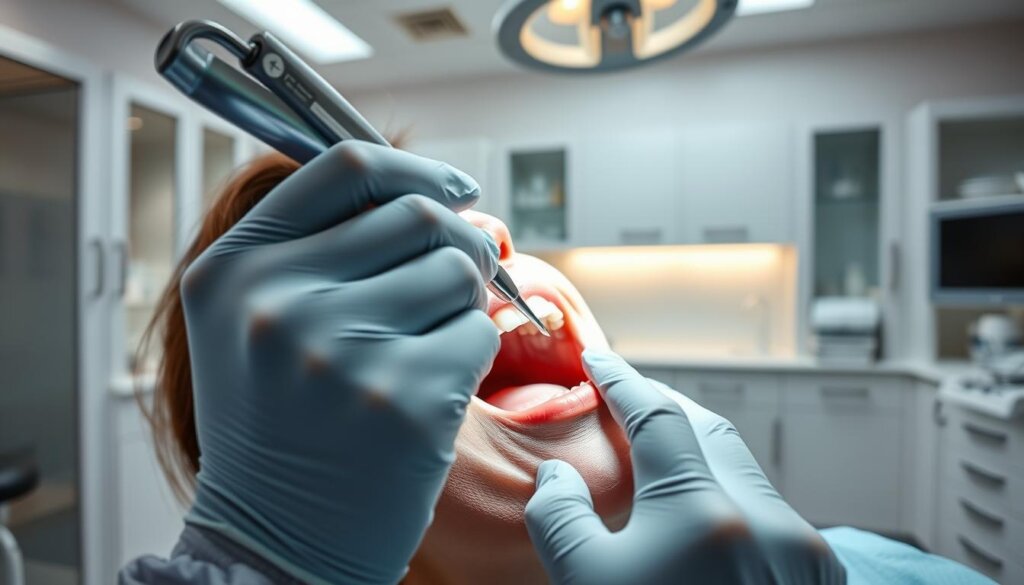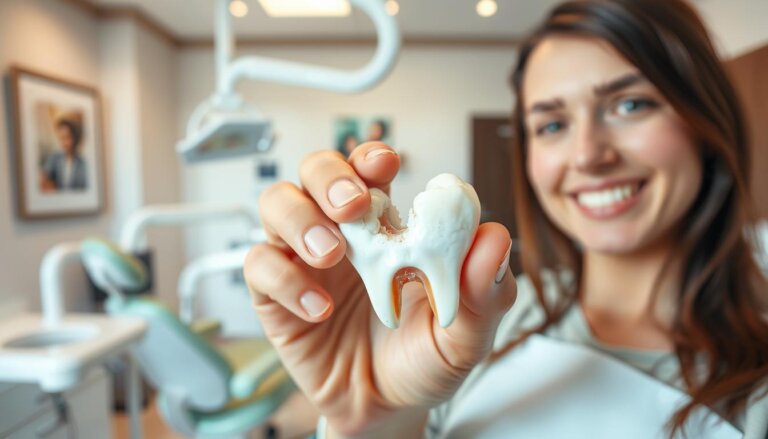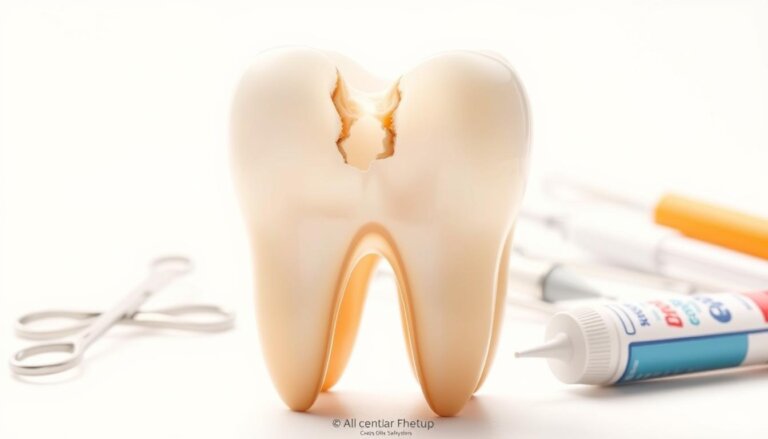How Much Does It Cost to Fix a Broken Tooth?
Every year, over five million teeth are knocked out in the United States. This is according to the American Association of Endodontists. It highlights how common dental injuries are and raises the question: How much does it cost to fix a broken tooth?
When a tooth cracks or chips, it’s important to get it treated quickly. This can range from simple fixes to more complex procedures. The cost depends on where the tooth is and how badly it’s damaged.
People, including doctors and patients, want to know the cost of fixing a broken tooth. This introduction will help us explore different treatments and their costs in the United States.
Key Takeaways
- Broken teeth are more common than many people think.
- Treatment cost hinges on tooth location and severity of the fracture.
- Early intervention helps lower the risk of infection and added fees.
- Repair options range from dental bonding to root canals.
- Understanding financial factors empowers readers to plan for care.
Understanding the Nature of a Broken Tooth
A broken tooth can make eating and smiling uncomfortable. It might start with small chips or grow into deep cracks. Dentists check the tooth’s strength, nerve health, and gum condition around it.
Seeing a dentist early can prevent bigger problems. It also helps keep the cost of fixing a broken tooth down.
Common Causes of Tooth Breakage
Tooth fractures can happen unexpectedly. They often come from:
- Biting down on hard foods or ice
- Sudden blows during sports incidents
- Repetitive grinding or clenching
- Weakened enamel due to certain medical conditions
Over time, teeth can become more prone to damage. Taking care of your enamel and visiting the dentist regularly can help spot problems early.
Signs and Symptoms of a Broken Tooth
There are clear signs of a tooth fracture. You might see small pieces of enamel or sharp edges. Pain when biting is another sign.
Sensitivity to hot or cold foods can mean nerve damage. Swollen gums near the tooth’s root are also a warning sign. This is why seeing a dentist quickly is important.
Recognizing these symptoms and getting to the dentist fast is key. It helps avoid bigger issues and keeps your smile healthy.
Factors Influencing Repair Costs
Many things affect the cost of fixing teeth. Each step in treatment can add to the bill. It’s smart to look at all the factors. Materials, how the treatment is done, and follow-up visits all play a part.
Type of Dental Procedure Required
Some fixes are simple, while others are complex. A small bonding might be enough for minor cracks. But, more detailed work needs advanced lab work. This can change the dental restoration expenses a lot.
Geographic Location and Its Impact on Pricing
Prices differ by location. Cities usually charge more because of higher costs. But, clinics in suburbs or rural areas might offer better deals.
Dentist’s Experience and Expertise
Experienced dentists might use the latest technology. This can mean fewer problems. Their extra training might make the treatment more expensive. But, it also means better care in the long run.
Overview of Common Repair Options
Many people look for ways to make their teeth strong again. They use different materials and methods to get a natural look and lasting results. The choice depends on what each person needs and wants to spend.
Dental Bonding
Dental bonding is a fast fix for small cracks or chips. A tooth-colored resin is applied to cover the problem area. This method keeps most of the natural enamel and looks good.
Crowns
Crowns are caps that protect teeth that have lost a lot of structure. They can be made from porcelain or metal. They look and work well, and dentists often suggest them for big repairs.
Veneers
Veneers are thin, custom-made shells for the front teeth. They are made of porcelain and look like real teeth. This option improves looks and alignment without surgery.
Root Canals
Root canals fix problems inside the tooth, like infections. They remove the bad tissue and help the tooth stay strong. After, a crown is usually put on for extra support. People often compare these options and look at prices before deciding.
The Cost Range for Each Repair Option
When a tooth breaks, you might wonder about the cost of fixing it. Knowing the cost helps you choose the best option for your budget and health. Several things affect the price:
- Complexity of the tooth damage
- Type of material used
- Laboratory involvement
Clinicians typically recommend a procedure based on the damage’s extent, infection risk, and durability needs.
Average Costs of Dental Bonding
Dental bonding is a cost-effective choice for small cracks or chips. A resin is applied, cured, and polished to match your tooth. Prices can vary, but it’s often affordable for many.
Crowns: Budgeting for Quality
Crowns are needed for more extensive damage. They cover and protect the tooth. The process involves shaping the tooth and creating a custom cap. Costs can rise due to lab fees and visits, but they offer lasting protection.
Veneers: What to Expect Price-Wise
Veneers are for those wanting to improve their smile. A thin layer of porcelain hides damage and enhances the tooth’s look. The process requires more visits and precise work, increasing the cost. Understanding the cost helps you choose wisely for both beauty and strength.
Insurance Coverage and Broken Teeth
Getting the right insurance can help lower costs for fixing teeth. Many insurance plans cover basic urgent care but have limits on more complex treatments. It’s smart to check all benefits in a plan to avoid surprises.
“The American Dental Association emphasizes that patients should review deductibles and waiting periods to prevent unexpected costs.”
Choosing a carrier like Delta Dental, Cigna, or MetLife might help with some costs for crowns and more. Each plan is different, so it’s key to know how they handle sudden dental issues.
Typical Dental Insurance Plans
Some plans cover routine care like exams and fillings. Others include more like veneers or implants. Most plans have different levels of coverage, paying more for basic care and less for complex treatments.
- Basic plans often cover exams and fillings
- Mid-range options may extend to crowns and root canals
- Premium plans sometimes address more extensive procedures
Dentistry Services That Are Usually Covered
Fillings and crowns are usually covered in standard plans. Some plans offer partial benefits for emergency visits, helping with Emergency dental care fees. But, each provider has its own limits and exclusions.
What to Do If You’re Uninsured
Dental savings programs or discount memberships can help if you’re uninsured. They offer lower rates and no annual limits. These are good for urgent care or for those on a tight budget for dental needs.
Additional Costs to Consider
When planning for a broken tooth, budgeting is key. Every step, from diagnosis to follow-up, affects the total cost. Knowing this helps patients plan financially and stay safe.
X-rays and Initial Consultations
Diagnostic imaging, like panoramic or bitewing X-rays, is often the first cost. A detailed consultation checks for internal cracks or other issues. This step is critical for planning the right treatment.
Follow-Up Visits
Some treatments need follow-up checks. These visits ensure the tooth is healing right. They also help avoid more complex procedures later.
Possible Need for Anesthesia
Deep fractures or high anxiety might require anesthesia. Here are some options:
- Local injection to numb the area for minimal discomfort
- Oral sedation to ease nerves during longer appointments
- Intravenous sedation for patients needing deeper relaxation
Each choice can increase the cost. Talking with a qualified provider helps make safe and practical decisions.
Emergency Dental Services and Their Costs
Unexpected tooth breakage can cause a lot of pain, even more so when it happens outside regular hours. Many emergency clinics are open for walk-ins or urgent calls. They quickly check the damage and try to fix it, focusing on pain relief first.
Immediate Care for Broken Teeth
Emergency dentists work hard to save the tooth. Sometimes, they use a temporary sealant to prevent infection. They then decide if more treatment is needed, which might cost more than a regular dental crown.
After-Hours Emergency Pricing
Visits in the evening or on weekends cost more than usual. Some dentists charge extra for these times because they need to staff up at night. Insurance might help cover these costs, but deductibles and copays can vary.
Reasons to Seek Emergency Care
Severe pain, bleeding, or seeing tooth pieces are signs you need help right away. Waiting can lead to bigger problems like abscesses or nerve damage. Getting help quickly might save you from more expensive treatments later.
Geographic Cost Variations in the U.S.
Where you live can affect how much you pay for dental work, like tooth fillings. Places with higher costs of living often have pricier dental services. It’s smart to check with local dentists about their fees and compare them.
Urban vs. Rural Area Pricing
City clinics usually charge more because of high costs. But, small towns might offer lower prices. Yet, they often have fewer dental options. This choice between cost and availability affects what you pay.
- Urban areas: Broader specialist availability
- Rural areas: Potentially lower bills, limited provider selection
State-by-State Comparison
Dental costs vary by state due to insurance rules and living costs. Some states have set prices for dental services. Looking at nearby states for dental care can save money without losing quality.
Payment Plans and Financing Options
Many people face big costs when they need dental care fast. Luckily, there are affordable tooth repair options to help with these costs.
Flexible payment plans let patients get care right away. They can pay over time, which helps keep their teeth healthy and avoids bigger problems later.
Flexible Payment Plans Offered by Dentists
Many clinics offer payment plans to make costs easier. They might work with credit bureaus or have their own financing. This way, patients can get the care they need without financial stress.
Third-Party Financing Services Available
CareCredit and similar services provide funding at good rates. Patients can apply online or in person for quick approval. This means they can get care right away, without waiting.
These options help people get the dental care they need without breaking the bank. It’s smart to look at different options and talk to experts before choosing a plan.
Cost-Saving Tips for Tooth Repairs
By following simple tips, you can save money on dental care. Being proactive and planning ahead can help keep costs down. This is true for many things, including dental health.
Preventative Care to Avoid Future Costs
Regular dental visits and cleanings can prevent problems. Healthy enamel protects teeth from damage. Using fluoride treatments and wearing mouthguards when playing sports is also important.
- Professional cleanings on a set schedule
- Daily brushing and flossing
- Well-fitted mouthguards
Seeking Multiple Quotes
Getting quotes from different dentists can help you find the best deal. It lets you compare prices and services. This way, you can make a smart choice that fits your budget.
When to Seek Professional Help
A small chip or a broken tooth might seem okay if the pain goes away. But, tiny cracks can grow and threaten the tooth’s health. Catching them early is key to avoiding bigger problems.
Swelling that won’t go away or sharp pains mean you need to see a dentist fast. Getting help quickly can save your tooth and keep your enamel strong.
Indicators for Consulting a Dentist
Keep an eye out for tooth sensitivity or rough edges. These signs can mean trouble for your tooth’s inner layers. Look out for:
- Recurrent throbbing that disrupts daily activities
- Visible fractures causing gum irritation
- Strange sensations when biting down
Importance of Timely Intervention
Waiting too long can lead to expensive and complex fixes. Cracks that reach the pulp need expert care. Acting fast helps keep your tooth strong and healthy for longer.
| Stage | Possible Complications | Estimated Expense |
|---|---|---|
| Early Fracture | Minor sensitivity, simpler repair | Lower range |
| Deep Crack | Potential pulp involvement | Moderate range |
| Severe Damage | High risk of infection, possible extraction | Higher range |
The Long-Term Value of Fixing a Broken Tooth
Fixing a broken tooth has many benefits. It makes your smile look better and keeps your teeth stable. It also helps you chew food properly and prevents other teeth from moving.
This approach stops bigger problems from happening. It also helps you keep up with good oral health habits.
Oral Health Benefits
A fixed tooth is less likely to get cavities or infections. It keeps your bite balanced and reduces jaw pain. This care also helps your gums stay healthy, lowering the risk of gum disease.
Impact on Overall Well-Being
Having a fixed tooth can make you feel more confident. It can improve how you interact with others and boost your self-esteem. It also helps you eat and speak better, supporting your overall health and happiness.
Conclusion: Making Informed Decisions About Your Smile
A strong set of teeth is key to good health and confidence. When you need to fix a broken tooth, it’s important to do your research. You should talk to dentists and compare prices in different places.
Every choice you make affects how you feel every day. It impacts your oral health and your future well-being.
Recap of Cost Considerations
The cost depends on the type of dental care, the dentist’s experience, and your insurance. People might choose bonding, crowns, or veneers for looks and function. If money is tight, there are financing options like monthly payments.
It’s important to think about the initial cost, any extra visits, and if you’ll need anesthesia. This helps you plan your budget better.
Encouragement to Prioritize Dental Health
Fixing chips or cracks early can prevent bigger problems. Regular check-ups and preventive care keep your teeth working well. Investing in fixing a broken tooth can lead to a healthy smile for years.
Even though it might seem expensive, regular care and advice from a dentist can greatly improve your life. It makes your smile last longer and keeps you comfortable.

